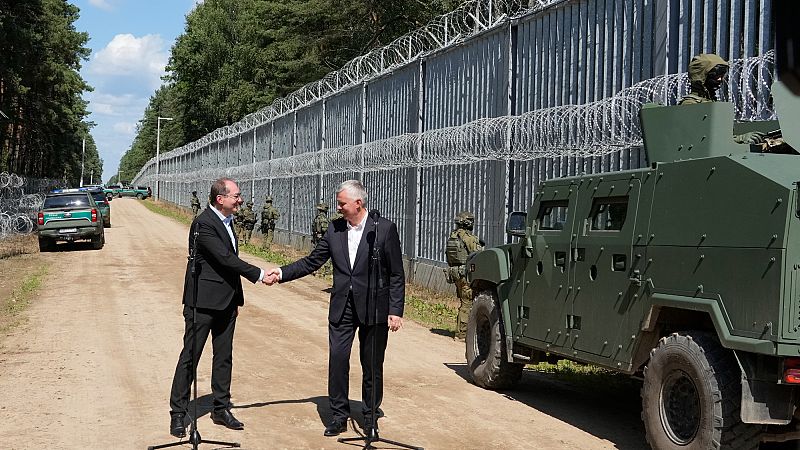
German Interior Minister Alexander Dobrindt has praised Poland's border control measures after visiting the Polish-Belarusian border.
"Here you can see how effective external border protection is done," he said during a visit with his Polish counterpart Tomasz Siemoniak on Monday, adding that it has had an "enormous impact".
Polish Prime Minister Donald Tusk and others in his government have long argued that Russia and Belarus are deliberately encouraging migrants to cross the border in an attempt to destabilise Poland, an ally of Ukraine, and the European Union.
Poland’s previous government reacted to the arrival of migrants by building a steel barrier and imposing a state of emergency in 2021.
Tusk's administration has recently ramped up measures to curb migration along Poland's heavily fortified border with Belarus.
The border is secured by a high steel fence and electronic surveillance equipment.
In May, the Polish parliament voted to extend the suspension of asylum applications from Belarus
The measure, which has been widely criticised by human rights groups, allows Polish authorities to suspend asylum rights for 60 days at a time.
Dobrindt said that it is a problem that Russia and Belarus are trying to use "migration as a weapon" to destabilise Poland, Germany and the European Union.
He also expressed support for Poland's recent decision to introduce temporary border controls in response to Germany's tighter checks.
Poland implemented border checks on its frontiers with fellow EU member states Germany and Lithuania earlier this month, in what Warsaw said was a step to check migrants more thoroughly amid public concerns over immigration.
Warsaw had claimed that Germany was transporting migrants into Polish territory after they reached Western Europe.
On Monday, the two interior ministers said that the reciprocal controls on the Polish-German border are temporary and their common goal is to lift them as soon as possible and to focus on protecting the EU's external borders.
"Poland is Germany's most important partner within the EU, alongside our French neighbours," Dobrindt said.
Germany and Poland, which share a 467-kilometre border, are both part of the visa-free Schengen Area, which typically allows citizens to travel across borders easily for work or pleasure.
Member states are allowed to introduce border controls in times of serious threat, according to the EU.
Germany first imposed controls on its borders with Poland in 2023 to combat human trafficking and curb irregular migration.
After taking office in May, Germany's Chancellor Friedrich Merz ordered more police to be stationed at Germany's borders and granted them powers to turn away some asylum seekers.







